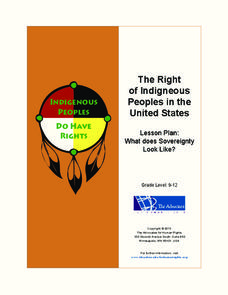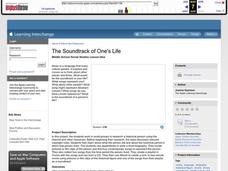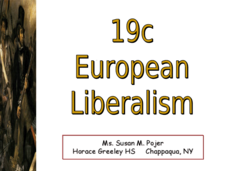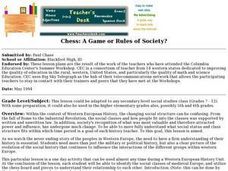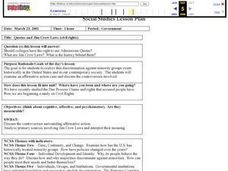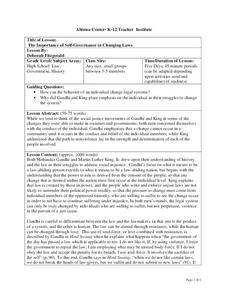Curated OER
"Getting Away with Torture?"
Students discuss what they know about the abuse of Iraqi prisoners at Abu Ghraib. They research policy memos and assess their influence on military personnel. They identify the Geneva Conventions rule on the treatment of prisoners as well.
Curated OER
Seeking Civil Rights
Learners explore the impact of the Plessy v. Ferguson case. In this social justice lesson, students examine the case, Jim Crow laws, and non-violent forms of protest. Learners write essays to persuade the government regarding unjust laws.
Curated OER
Juvenile Justice-Disposition
Young scholars explore the dispositional hearing as a part of the juvenile justice system. After a brief discussion of the parts of the disposition hearing, students work in groups to review case studies involving juveniles in Utah's...
Advocates for Human Rights
The Right of Indigneous Peoples in the United States
The sovereignty of U.S. Native American nations is the focus of a resource that asks class members to compare the Right to Self-Determination in the UN Declaration on the Rights of Indigenous Peoples with a fact sheet that...
Curated OER
The Soundtrack of One's Life
Students gather important information about a historical figure. They write a short biography, including illustrations. Students collect songs from the time period when the person lived. They create a play list in iTunes. Students...
Alabama Department of Archives and History
Alabama's Steps to Statehood
To demonstrate their understanding of the steps Alabama took to become a state, groups create a poster that identifies what the United States Constitution and the Northwest Ordinance required of a territory to become a state.
C-SPAN
Judicial Review and Marbury v Madison
The Supreme Court case Marbury v. Madison may not be widely recognized but the landmark case is particularly significant because it established the precedent for judicial review and that the Supreme Court had power as an interpreter of...
School Improvement in Maryland
Political Systems: Advantages and Disadvantages
Every political system has advantages and disadvantages. To gain an understanding of these differences, groups investigate the political system of another country—oligarchy, monarchy, dictatorship, parliamentary—and prepare a...
Curated OER
Bill of Rights
US history classes explore constitutional rights as they relate to court cases involving teens. Your class must already be familiar with the Bill of Rights before beginning this series of exercises. In preparation for a debate-style...
Friends of Fort McHenry
Privateers in the War of 1812: Soldiers or Thieves?
Do governments have the right to authorize individuals to perform illegal acts during times of war? Did the US government really employ pirates? Use the War of 1812 as your vessel to answering these questions through class discussion and...
Curated OER
19c European Liberalism
If you'd like to prompt some great discussions in your history class, this presentation will surely get your class talking. Addressing 19th century liberalism in Europe (including influences from England, France, America, and Ireland),...
Curated OER
Molly Pitcher -- "Out of Many, One"
Young scholars research, brainstorm and analyze the events that lead up to the Revolutionary War. They critique a piece of artwork depicting a scene from the Revolutionary War. Each major battle is plotted on a map to show a visual...
School Improvement in Maryland
Building a Pyramid
After reviewing the structure and powers of the three branches of the US government, groups investigate a problem and research what is being done to address this criticism.
National History Day
Challenging the Status Quo: Women in the World War I Military
Why are some so resistant to change? The status quo is often to blame for a lack of forward movement in society. Following the events of World War I, women in America suddenly had a voice—and were going to use it. Scholars use the...
Curated OER
The King's New Rules
In this world history worksheet, students utilize a word bank of 10 terms or phrases to answer 10 fill in the blank questions pertaining to the colonies prior to the Revolutionary War. A short answer question is included as well.
Curated OER
Environmental Law
Students analyze the environmental impact of pollution. They demonstrate an understanding of law, punishment and enforcement. Applying their knowledge, they create their own anti-pollution laws.
Curated OER
Chess: A Game or Rules of Society
Students identify the social classes of medieval Europe, and utilize the chess board and pieces to explain their relationship to each other.
Curated OER
The U.S. Constitution and Disability Laws
Students examine the United States Constitution for laws that protect people with disabilities. They discover how the education system provides equal education to all students and how the Federal Government makes sure this is occuring.
Curated OER
Quotas and Jim Crow Laws
Learners examine the use of quotas and Jim Crow laws. They discuss discrimination against minority groups both historically and in contemporary society. Students examine an affirmative action case and discuss the controversies involved.
Curated OER
The Importance of Self-Governance in Changing Laws
Students examine the teachings of Gandhi and King. In this nonviolent resistance lesson, students listen to a lecture that reveals how Gandhi and King educated their followers about nonviolent resistance. Students analyze contemporary...
Curated OER
Laws of Civil Rights
Young scholars investigate the Civil Rights Act of 1964. In this segregation lesson, students explore the rights that were guaranteed by the legislation as well as attempts by southerners to stop African Americans from voting. Young...
Curated OER
Chapter 19: Disputes Over Macro Theory and Policy
Instruct your future businessmen and women about the different theories of economics in this informative presentation. With graphs and thorough explanations, these slides would couple well with a lecture on Classical and Keynesian...
Civil Rights Movement Veterans
Timeline of Events: 1960’s Civil Rights Movement of St. Augustine, Florida
A timeline can be a powerful learning tool because it reveals a pattern in events. While few would consider St. Augustine, Florida a hotbed of the 1960s Civil Rights Movement, a selection of background information and a timeline of...
Curated OER
Why Do Governments Exist? Locke, Hobbes, Montesquieu, and Rousseau
Here is a great secondary source reading that includes the primary ideas and philosophies of the famed Enlightenment philosophers: Thomas Hobbes, John Locke, Charles Montesquieu, and Jean-Jacques Rousseau. In additional to discussing...



